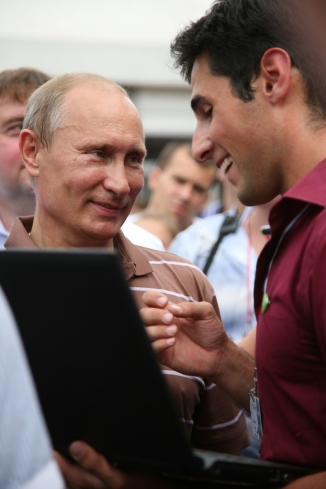ReactOS, do you get in touch again?

Seliger, Zvorykin Prize and President
This year, Alexander Rechitsky and Marat Karatov again went to Seliger to represent the interests of the project there. The good news is that this time the project successfully passed the technological expertise, entered the third round of the Zvorykin Prize and is currently ranked 3rd in the rating in the nomination for the best IT project (although the information on the award website has not yet been updated). It seemed that this was the result of a visit to the “Innovation and technical creativity” shift, but ...

 Unexpected news came just a few days ago. The winners of the shift were invited to a meeting with the President of Russia, who arrived at Seliger. Alas, Alexander has already finished his vacation, so the question of who will go again is not even standing - Marat has the greatest experience in this matter. Alexey Bragin was also going to go with him, but he never got there, because I did not have time to return so quickly and unexpectedly from abroad (the trip, by the way, was related to negotiations with potential customers, but the details will come later).
Unexpected news came just a few days ago. The winners of the shift were invited to a meeting with the President of Russia, who arrived at Seliger. Alas, Alexander has already finished his vacation, so the question of who will go again is not even standing - Marat has the greatest experience in this matter. Alexey Bragin was also going to go with him, but he never got there, because I did not have time to return so quickly and unexpectedly from abroad (the trip, by the way, was related to negotiations with potential customers, but the details will come later).')
Despite all the difficulties, of which there were not a few, Marat coped brilliantly, and he was able to personally communicate with Vladimir Vladimirovich and brief him about our latest achievements.
Updated ATA controller drivers
Recently, Alter , the author of the universal driver for hard disk controllers Uniata , actively collaborates with the developers of our project, which has had a very fruitful impact on the results. All changes made in the driver code by ReactOS programmers were agreed with the author of Uniata and made by him to the main tree. This allows us to no longer patch the original driver with previous own patches and spend time on it (sometimes accidentally introducing new errors), but concentrate on further development.
In the new version of Uniata there is a cardinal innovation (in addition to fixing many errors, and a related fix in the scsiport.sys driver, due to which many controllers were not detected) - this is support for AHCI . This is a very recent change (revision 57018 ), allowing sata devices to work in native mode. Support NCQ, HotPlug, SATA2, SATA3 is just around the corner! Therefore, everyone is invited to test.
It was also decided to add the atactl utility (this is a console utility for managing ATA controllers and devices connected to them) to the main development tree of the operating system.
Jonescu is back and improving Memory Manager
Alex Yonescu finally truly returned, and set to work. His short-term goal is to correct the errors in the memory manager in the kernel (which should bring stability and correct many regressions resulting from active work on the memory manager). In the future, he plans to add other modules (for example, csrss)
Cooperation with the 3rd party
That is the moment when a joint investigation of bugs leads to the appearance of records not only in the ReactOS changer log, but also in the change lists of third-party software.
A good example is Total Commander:
www.reactos.org/bugzilla/show_bug.cgi?id=4856 - a bug report, thanks to which ReactOS can be found in the files in the links below:
www.ghisler.com/history757.txt
www.ghisler.com/history801.txt
First contract
The first paid development contract has been concluded. The first “lucky guy” was Edijs Kolesnikovics from Lithuania. He joined our team not so long ago and worked intensively with Amine Khaldi and Olaf Siejka to create an automated application testing system in ReactOS. This system is based on AutoHotKey (AHK), a tool for “reproducing” a previously recorded keyboard and mouse action sequence to automate the execution of programs in Windows. Despite the fact that the existing testing system (based on the implementation of a set of various synthetic tests) helps to identify various problems quite well, the most important thing for the end user in the entire operating system is how various applications work in it. Therefore, Edijs decided to devote particular attention to this, to automate this process, starting with the “Gold List” of programs already working well in ReactOS.
The main framework has already been made, the essence of the contract is to develop as many application scripts as possible for a given period of time. The minimum result is testing support for the entire set of programs from the “ Gold List ”. The price of the first contract for a number of reasons is symbolic and amounts to 168 euros for 84 working hours (that is, slightly less than 2 euros per hour). It remains to say thanks to Edijs for not asking for more pay, but indicated exactly that minimum which we are willing to pay (in general, we do not plan to pay for work at a rate of less than 2 euros per hour).
Fundraising campaign continues
The Edijs Kolesnikovics contract will be paid for thanks to the latest fundraising campaign in the history of ReactOS.
At the moment, almost $ 7,000 of the required $ 30,000 has been raised. You can donate money in a dozen different ways, and our project will be happy with even the most modest amounts.
Source: https://habr.com/ru/post/148950/
All Articles